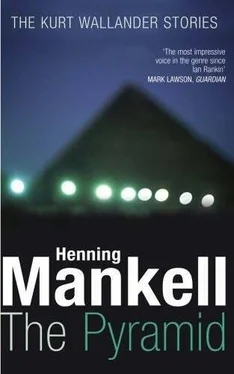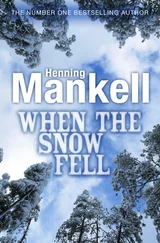Wallander often felt that Martinsson was bad at formulating simple and clear explanations.
'Let's go over this again,' Wallander said. 'Robert Haverberg heard the engine noise?'
'Yes.'
'When was this?'
'He had just woken up. Sometime around five o'clock.'
Wallander frowned.
'But the plane crashed half an hour later?'
'That's what I said. But he was very firm on this point. First he heard the sound of a passing plane, at a low altitude. Then it grew quiet. He made some coffee. And then the sound returned, and then the explosion.'
Wallander reflected on this. What Martinsson had told him was clearly significant.
'How much time elapsed between the first time he heard the sound and the subsequent crash?'
'We worked out that it must have taken around twenty minutes.'
Wallander looked at Martinsson.
'How do you account for that?'
'I don't know.'
'Did the old man seem sharp?'
'Yes. He also has good hearing.'
'Do you have a map in your car?' Wallander asked.
Martinsson nodded. They walked up to the dirt road where Hansson was still talking with the media. One of them saw Wallander and started approaching him. Wallander waved dismissively.
'I have nothing to say,' he called out.
They got into Martinsson's car and unfolded the map. Wallander studied it in silence. He thought about what Rydberg had said, about aeroplanes on illegal missions, beyond authorised air lanes and control towers.
'One could imagine the following,' Wallander said. 'A plane comes in low over the coast, passes by and continues out of earshot. Returns shortly thereafter. And then it goes straight down.'
'You mean it dropped something off somewhere? And then turned back?' Martinsson asked.
'Something like that.'
Wallander folded the map back up.
'We know too little. Rydberg is on his way to Sturup. Then we have to try to identify the bodies, as well as the plane itself. We can't do any more at the moment.'
'I've always been a nervous flyer,' Martinsson said. 'It doesn't exactly help to see things like this. But it's even worse when Teres talks about becoming a pilot.'
Teres was Martinsson's daughter. He also had a son. Martinsson was a real family man. He was always worried that something might have happened and called home several times a day. Often he went home for lunch. Sometimes Wallander was a little envious of his colleague's seemingly problem-free marriage.
'Tell Nyberg we're going now,' he said to Martinsson.
Wallander waited in the car. The landscape around him was grey and desolate. He shivered. Life goes on, he thought. I've just turned forty-two. Will I end up like Rydberg? A lonely old man with rheumatism?
Wallander shook off these thoughts.
Martinsson returned and they drove back to Ystad.
At eleven o'clock Wallander stood up to go to the room where a suspected drug dealer by the name of Yngve Leonard Holm was waiting for him. At that moment Rydberg came in. He never bothered to knock. He sat down in the visitor's chair and got straight to the point.
'I've talked to an air traffic controller by the name of Lycke,' he said. 'He claimed to know you.'
'I've spoken to him before, I don't remember the context.'
'He was very firm, in any case,' Rydberg continued. 'No single-engine plane was cleared to pass over Mossby at five o'clock this morning. They have also not received any emergency broadcast from any pilot. The radar screens have been empty. There were no strange signals that may have indicated the presence of an unidentified plane. According to Lycke, the plane that crashed did not exist. They have already reported this both to the defence department and to God knows how many other authorities. Customs, probably.'
'So you were right,' Wallander said. 'Someone was out on an illegal mission.'
'We don't know that,' Rydberg objected. 'Someone was flying illegally. But if it was also an illegal mission, we don't know.'
'Who would be out flying around in the dark without a particular reason?'
'There are so many idiots,' Rydberg said. 'You should know that.'
Wallander looked closer at him.
'You don't believe that for a minute, do you?'
'Of course not,' Rydberg said. 'But until we know who they were or identify the plane, we can't do anything. This has to go to Interpol. I'm willing to wager a pretty penny that the plane came from the outside.'
Rydberg left.
Wallander mulled over what he had said.
Then he stood up, took his papers and walked to the room where Yngve Leonard Holm was waiting with his lawyer.
It was exactly a quarter past eleven when Wallander started the tape recorder and began his interrogation.
Wallander turned off the tape recorder after one hour and ten minutes. He had had enough of Yngve Leonard Holm. Both because of the man's attitude and the fact that they were going to have to release him. Wallander was convinced that the man on the other side of the table was guilty of repeated and serious drug offences. But there was not one prosecutor in the world who would judge their pre-investigation worthy of taking to trial. Certainly not Per Åkeson, to whom Wallander was going to submit his report.
Yngve Leonard Holm was thirty-seven years old. He was born in Ronneby but had been registered as a resident of Ystad since the mid- 1980s. He listed his profession as a paperback-book salesman at outdoor summer markets, specialising in the 'Manhattan series'. For the last few years he had declared a negligible income. At the same time, he was having a large villa built in an area close to the police station. The house was taxed at several million kronor. Holm claimed to be financing the house with large gambling profits from both the Jägersro and Solvalla tracks, as well as various racetracks in Germany and France. Predictably, he had no receipts for his wins. They had disappeared when the trailer where he had stored his financial records caught fire. The only receipt he could show was a lesser one for 4,993 kronor that he had claimed a couple of weeks earlier. Possibly, Wallander thought, this indicated that Holm knew something about horses. But it hardly meant more than that. Hansson should have been sitting here in my place. He is also interested in racing. They could have talked horses to each other.
Nothing of this altered Wallander's conviction that Holm was the final link in a chain that imported and sold significant amounts of drugs in southern Sweden. The circumstantial evidence was overwhelming. But Holm's arrest had been very poorly organised. The raids should have been synchronised to take place at the same time. One at Holm's house, the other at the warehouse in an industrial area in Malmö where he rented space for his paperbacks. It had been a coordinated operation between the police in Ystad and their colleagues in Malmö.
But something had gone wrong from the start. The warehouse space had been empty, except for a lone box of old, well-thumbed Manhattan books. Holm had been watching TV in his house when they rang the bell. A young woman was curled up at his feet, massaging his toes, while the police searched the house. They found nothing. One of the drug-sniffing dogs they had brought in from customs had spent a long time sniffing a handkerchief they had found in the rubbish. Chemical analysis had only been able to establish that the cloth could have come into contact with a drug. In some way, Holm had been tipped off about the raid. Wallander did not doubt that the man was both intelligent and good at covering up his activities.
'We have to let you go,' he said. 'But our suspicion of you remains. Or, to be precise, I'm convinced that you're involved in extensive drug trafficking in Skåne. Sooner or later, we will get you.'
Читать дальше












